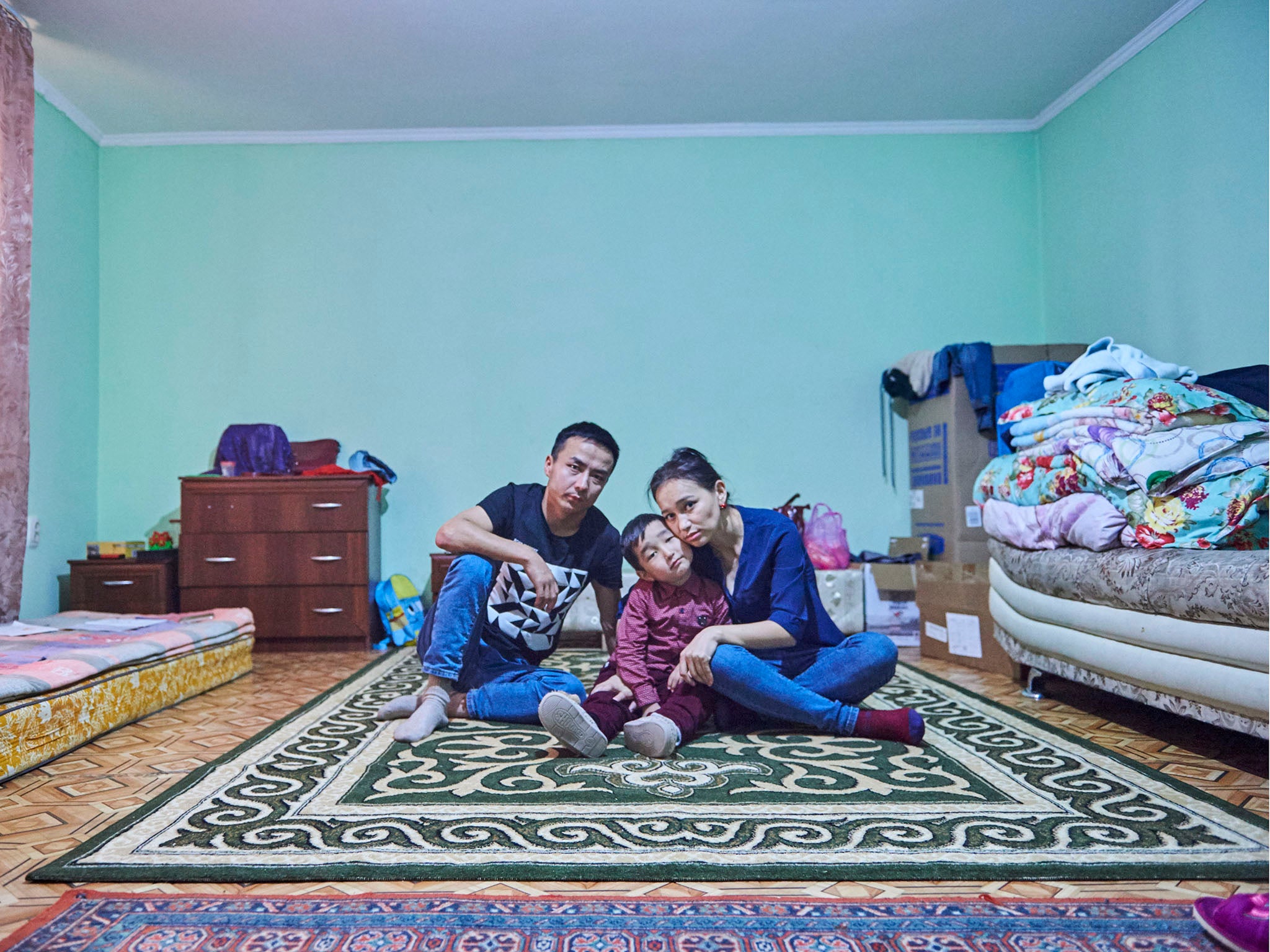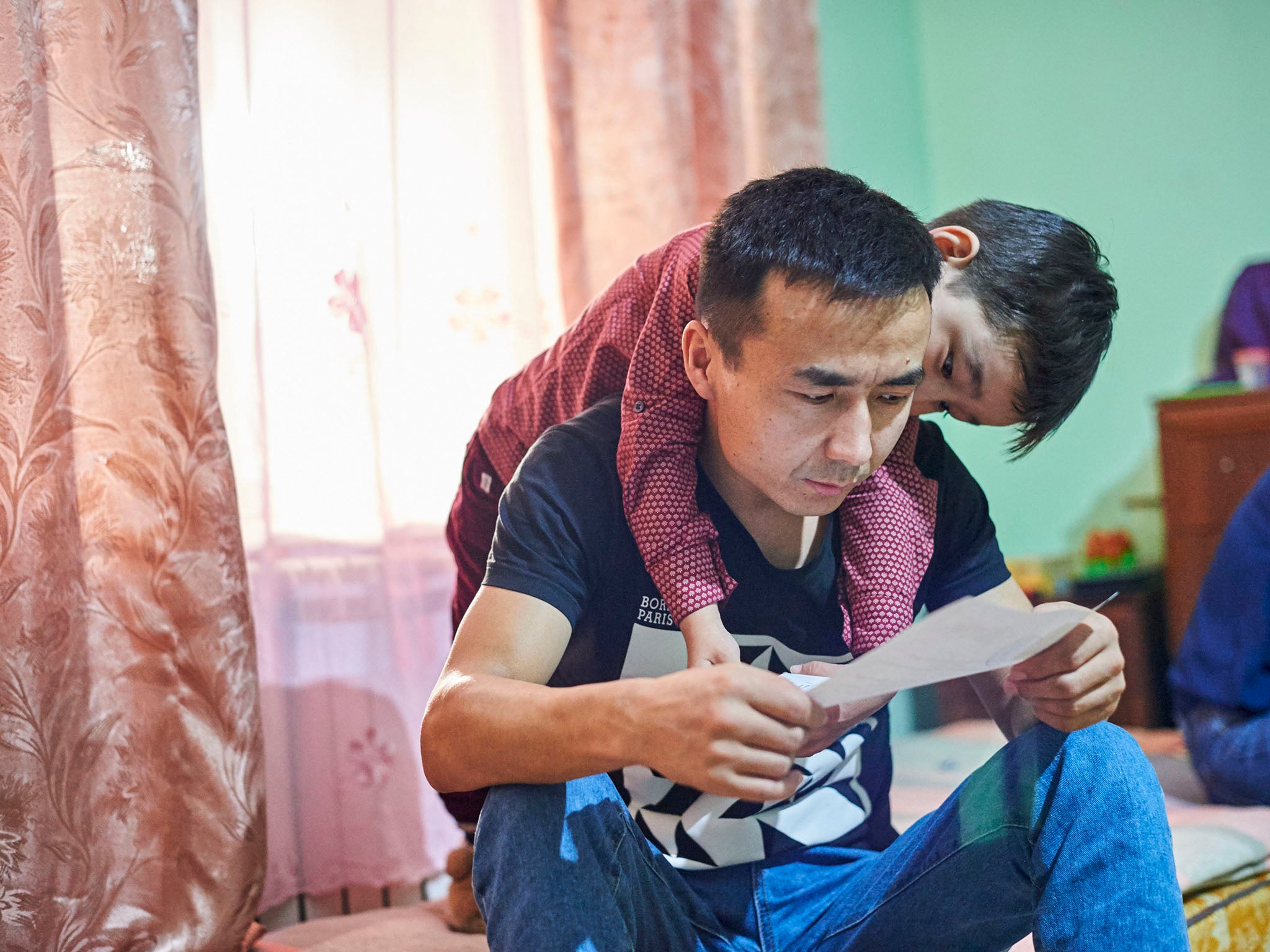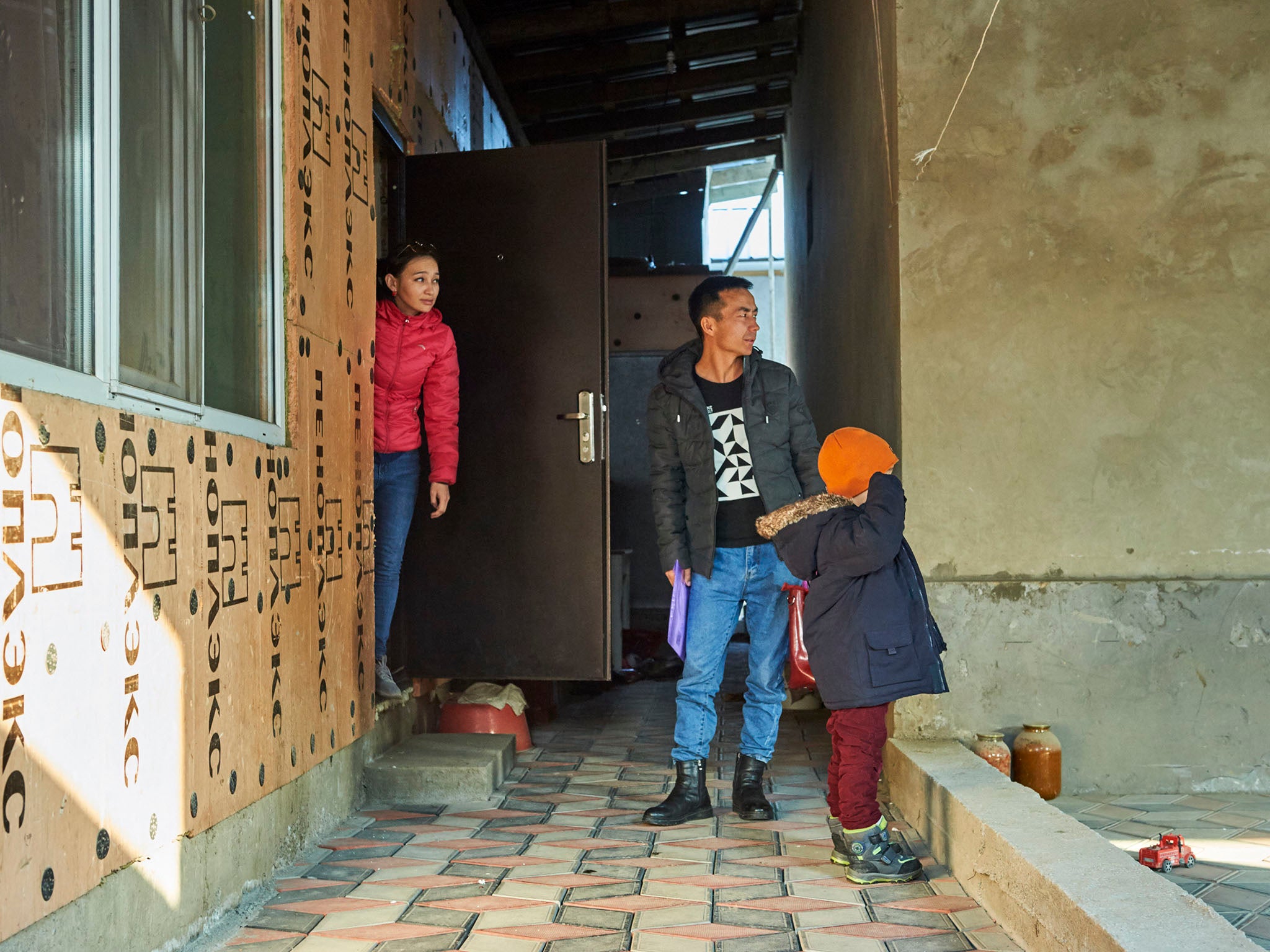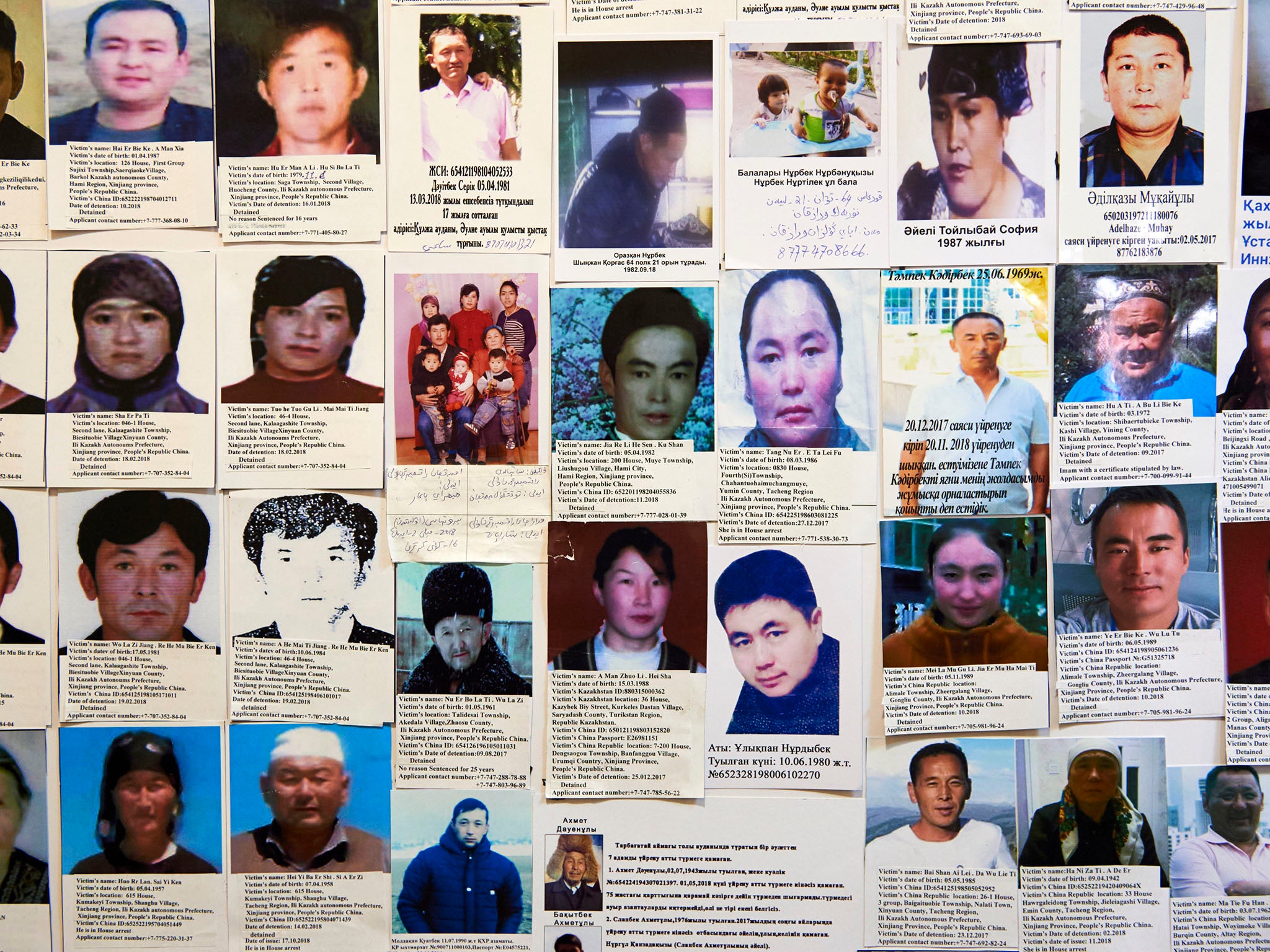Kazakhs are the latest victims in Chinese war on Islam
The Muslim ‘crackdown’ has seen millions of minorities locked up in the country’s notorious ‘reeducation’ camps – now the regime is going after ethnic Kazakhs, writes Reid Standish

Your support helps us to tell the story
From reproductive rights to climate change to Big Tech, The Independent is on the ground when the story is developing. Whether it's investigating the financials of Elon Musk's pro-Trump PAC or producing our latest documentary, 'The A Word', which shines a light on the American women fighting for reproductive rights, we know how important it is to parse out the facts from the messaging.
At such a critical moment in US history, we need reporters on the ground. Your donation allows us to keep sending journalists to speak to both sides of the story.
The Independent is trusted by Americans across the entire political spectrum. And unlike many other quality news outlets, we choose not to lock Americans out of our reporting and analysis with paywalls. We believe quality journalism should be available to everyone, paid for by those who can afford it.
Your support makes all the difference.Sometimes Zharqynbek Otan can be found in the middle of the night, standing stiffly at attention beside the bed he shares with his wife, Shynar Kylysheva. She says his memory fails him, and he periodically wanders off into the streets here in Kazakhstan’s largest city. When his family manages to find him, he has difficulty recognising them and resists returning home.
Otan, a 31-year-old cook, spent nearly two years in various forms of detention in neighbouring China, including in one of the notorious “reeducation” camps in Xinjiang, the massive western region that shares a 1,100-mile border with Kazakhstan. His wife petitioned tirelessly for his release from a camp in Zhaosu County, but when he came home in late 2018, he brought the trauma of his ordeal back across the border with him: Otan is not the man he was.
Cases like his are common in this part of the country. And they represent a significant shift in Beijing’s repressive approach to Muslim minorities. For decades, China has suppressed the language and faith of its Muslim citizens. But until recently, the effort has been contained largely within China’s own borders.
Now the sweep has come to include the fluid region where Chinese nationals and Kazakh citizens have long moved freely back and forth between their countries, with those on opposite sides of the border mingling and marrying and working among one another.
Like thousands of other ethnic Kazakhs caught up in the crackdown, Otan is a Chinese national married to a Kazakh citizen and living in Kazakhstan as a legal resident. He travelled to China in late 2016 to obtain documents necessary for taking Kazakh citizenship. Instead, officials arrested him, seized his passport and sent him to a camp in January 2017, Otan says, where he lived alongside people whose ethnic identities, distinct from the Han majority that controls China, seem to scare Beijing.
Prisoners at these places are taught to abandon their Turkic-based mothertongues and renounce outward displays of Islam. And while the targets have for years been supposed domestic enemies, China now pursues some Kazakhs with the same zeal – cleaving families and even violating Kazakhstan’s sovereignty to send them for reeducation in the expanding camp system.
It’s unclear exactly how many people are in some sort of detention in Xinjiang, but the state department estimates that 800,000 to 2 million people have been detained since 2017. After initially denying the existence of the reeducation camps, Beijing has since switched to defending them as necessary to combat Islamist extremism and terrorism. The state primarily targets Uighurs, the Turkic group that makes up the largest share of Muslims in China, but other Muslim minorities, like Kyrgyz, Hui and, increasingly, Kazakhs – both citizens of Kazakhstan and ethnic Kazakh Chinese nationals – have been caught in the broadening dragnet.
Rian Thum, a senior research fellow at the University of Nottingham and an expert on Xinjiang, tells me he was surprised to see Kazakhs swept up in the camps along with Uighurs, given that Kazakhs had long been viewed by the Chinese state as a model Muslim group that accepted Communist Party rule. There are nearly 1.5 million ethnic Kazakhs living in Xinjiang, making them the second-largest Muslim group in the region after Uighurs. Thum says the new hard line against Kazakhs is motivated by the same “blend of Islamophobia and racism” towards Muslim minorities that has led Uighurs to be viewed as dangerous.

“Distrust has spread to any ethnic group that has cultural similarity to the Uighurs,” he says. “If you are non-Chinese and majority Muslim, your group is viewed as a threat by the Communist Party.”
Detailed information about what is transpiring in Xinjiang itself is hard to find. The region has become a dystopian police state, complete with public video surveillance, regular scans of digital devices and coded ID cards used to track the movements of their holders. Those who have managed to escape detention and leave Xinjiang report being told to stay silent about their ordeal, lest their relatives in China be imprisoned in their place. But after conducting 60 interviews in Kazakhstan with former detainees and people with relatives missing in Xinjiang, I see a grim picture emerging from inside the region.
There’s no single reason for China’s crackdown in Xinjiang or for its spread. Things took a turn in 2009 after riots in Xinjiang claimed 200 mostly Han lives. Terrorist attacks by Uighurs in the following years escalated the security situation, culminating in swift retaliation by Beijing in the name of fighting extremism.
But the current “people’s war” on terrorism is less about that than about the strategic importance of Xinjiang and a rising strain of Han nationalism. Xinjiang’s western location makes it a vital launching spot for Beijing’s trillion-dollar Belt and Road global infrastructure project, and the Chinese government has taken to stamping out any form of perceived unrest or lawlessness that could hamper its economic prospects.
Meanwhile, nationalism has led to more aggressive attempts at coerced cultural assimilation for minorities and a deep suspicion of all religions, with Islam paramount among them. The reeducation camp system is in part an effort to make Muslim minorities adopt a pan-Chinese identity, forcing them to learn Mandarin, memorise Communist Party songs and eat pork. Religion, particularly Islam, is seen as contradictory to this Chinese identity, and officials have spoken openly about the need to “Sinicise” Islam and make it “compatible with socialism”. These efforts, however, have taken the form of an extreme human engineering project.
“They said that I was a traitor because I lived in Kazakhstan,” says Gulzira Auelkhankyzy, an ethnic Kazakh Chinese national who spent 15 months in a reeducation camp in Xinjiang. Auelkhankyzy had been working as a seamstress and living in Kazakhstan as a legal resident with her husband, who abandoned his Chinese passport for Kazakh citizenship. Their two children, who are Chinese citizens, stayed in Xinjiang with their grandparents, and Auelkhankyzy was detained in China while fetching them to live in Kazakhstan.
During her detention, Auelkhankyzy says, she was interrogated about her ties abroad and accused of espionage because of her time in Kazakhstan. After her release from the camp, where she was forced to learn Chinese and live in squalor, Chinese officials demanded that Auelkhankyzy sign a contract to work at a Xinjiang factory sewing gloves for £70 a month. She laboured for three months there before being allowed to return to Kazakhstan in January. She is now reunited with her husband, although their children remain in Xinjiang.
Auelkhankyzy says she still thinks about the women with whom she was interned. “Lots of us were mothers, but we couldn’t see our children and often wondered who was taking care of them,” she says. “Xinjiang has become a land of orphans.”
Ethnic Kazakhs previously moved with ease between China and Kazakhstan, which positioned itself as the ancestral homeland for the Kazakh diaspora spread across Eurasia after the collapse of the Soviet Union. Roughly 200,000 Chinese nationals became citizens of Kazakhstan so they could live there after the country of 18 million gained independence in 1991.
But cross-border ties have become a liability for those inside China and have caused them to be viewed with suspicion. According to a report by Human Rights Watch, foreign connections are now considered a punishable offence, with the authorities in Xinjiang targeting people who have ties to 26 “sensitive countries”, Kazakhstan among them.
“So many Kazakhs [in China] have strong links abroad,” says Gene Bunin, a Russian American writer and translator who runs the Xinjiang Victims Database, a project documenting the testimonies of detainees and their families. “You can’t do a crackdown in Xinjiang without also targeting the Kazakhs, otherwise information would reach the world even more than it has.”

An exact accounting of the ethnic breakdown of the camp system is unavailable, and the diverging sets of available figures highlight the difficulties and competing interests in gleaning the full scope of what is happening to Kazakhs in Xinjiang. Atajurt Eriktileri, a grassroots organisation in Almaty helping families with missing relatives in Xinjiang, tells me it has documented more than 10,000 cases of ethnic Kazakhs interned in China. The victims database headed by Bunin has collected nearly 3,000 testimonies in the past year, about half from ethnic Kazakhs, but that figure represents only a small fraction of the estimated total.
The Kazakh government has spoken publicly only about the cases pertaining to its own citizens, saying that 29 have been detained in recent years in China, of whom 15 have been released, but it has framed the issue as a bureaucratic error rather than extrajudicial detention. For the thousands of ethnic Kazakhs sent to the camps who are Chinese nationals – even those who were permanent residents of Kazakhstan – there are few avenues for recourse, and cases like Otan’s and Auelkhankyzy’s are the exceptions.
While the camps are the most extreme form of detention, other Kazakhs have been jailed or placed under house arrest, or simply had their passports seized upon entering China and are now unable to leave. Oral Zhanabil tells me that his father, Turan Mukhametkan, a Chinese citizen living in Kazakhstan, was detained while travelling to Xinjiang to collect his pension money in September 2017. Zhanabil doesn’t know the official reason for his father’s detention, but after spending nearly a year in a camp, Mukhametkan was released under house arrest in January; he has still not been able to leave China.
Other cases are more politically sensitive for Kazakhstan’s autocratic government, which prizes its relationship with Beijing. Askar Azatbek, a former Xinjiang official who became a Kazakh citizen, was apparently taken in December 2017 while on the Kazakh side of Khorgos, a free-trade zone on the border. Azatbek was with a friend when two cars came from the Chinese side and detained them. The friend was released, but Azatbek was taken to China, and his relatives have not had contact with him since.
Sayragul Sauytbay, an ethnic Kazakh Chinese national who worked in a camp and crossed illegally into Kazakhstan in April 2018 after finding out that she herself would be detained in one, is another diplomatic headache for the Kazakh government. Sauytbay is trying to claim asylum and says she knows the inner workings of the camps, but her application has been denied by the Kazakh government twice. When I interviewed her in January for Foreign Policy magazine, she said Chinese officials had tried to keep her silent by threatening her relatives still in Xinjiang. She feared that Kazakhstan would soon bend to growing pressure from Beijing for her extradition and send her back to China.

These cases present a diplomatic minefield for the Kazakh government. China is one of Kazakhstan’s main investors and a strategic partner in the Belt and Road initiative. In the past, Kazakh authorities have sent Uighur asylum seekers back to China, and the Kazakh government’s poor human rights record shows that it has few reservations about mistreating its own people.
But Sauytbay’s case and the plight of ethnic Kazakhs in Xinjiang have shifted public opinion to their side, and the Kazakh government has consequently engaged in behind-the-scenes negotiations with the Chinese to secure the release of some Kazakhs in the camps.
While this diplomatic activity has been encouraging for families with relatives interned in Xinjiang, there are signs that the Kazakh authorities are unnerved by the outpouring of support at home for the detained Kazakhs. Serikzhan Bilash, the head of Atajurt Eriktileri, was fined in February by an Almaty court for operating an unregistered organisation, despite having his previous attempts to register denied by the state.
Bilash tells me he expects more attempts by Kazakh authorities to use legal means to impede his organisation’s work. And Sauytbay fired her lawyer after he became unreachable at key moments in her case and encouraged her to be silent, she says.
The Kazakh government has made clear that it won’t stand up to China as it tries to erase the identities of Muslims in Xinjiang. But with internment camps next door continuing to swell with Kazakhs, Uighurs and other groups, the truth about Xinjiang may become too big to ignore.
© Washington Post
Join our commenting forum
Join thought-provoking conversations, follow other Independent readers and see their replies
Comments